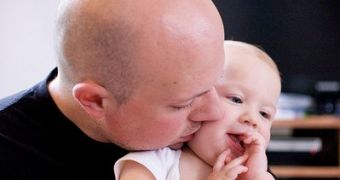Most new parents adopt baby talk when addressing their children, but they should know that their babies, even if they are too young to talk, understand many of the words adults say, since their brains process them in a grown-up way.
Scientists at the University of California, San Diego, used MRI and MEG technologies to show that babies barely over a year old process the words they hear with the same brain structures as adults do, and during the same amount of time too.
Also, the babies' brains are not just processing the words as if they were sounds, but are actually seizing their meaning.
MEG – an imaging process that measures tiny magnetic fields emitted by neurons in the brain, was used to establish whether babies use the same functional networks to process word meaning as adults, and MRI helped estimate the brain activity of babies aged 12 to 18 months.
In the first of the two experiments, the babies listened to a series of words and to sounds that were similar to those words but had no meaning, so that researchers could see whether they were able to make the difference between the two or not.
Then, the scientists wanted to see whether the babies were able to understand the meaning of these words, so they showed them pictures of familiar objects and played either matched or mismatched words – for example after a picture of a ball, they would play the word 'ball' or another word, like dog.
The amplitude of brain activity showed that the infants were capable of detecting the mismatch between a picture and a word – the MRI showed a brain response in the same left frontotemporal areas that process word meaning in adults.
Adults underwent the same tests to confirm the brain responses in the same brain areas.
Eric Halgren, PhD, professor of radiology in the School of Medicine, UC San Diego, said that the “study shows that the neural machinery used by adults to understand words is already functional when words are first being learned.
“This basic process seems to embody the process whereby words are understood, as well as the context for learning new words.”
First author, Katherine E. Travis, of the Department of Neurosciences and the Multimodal Imaging Laboratory, UC San Diego, added that “babies are using the same brain mechanisms as adults to access the meaning of words from what is thought to be a mental 'database' of meanings, a database which is continually being updated right into adulthood.”
Before this last study, many people believed that babies use different mechanisms to learn words, starting with a very primitive one that evolved into the process adults use.
Also, researchers had some difficulties determining the brain areas that were responsible for learning language, since there was not enough evidence of where language is processed in the developing brain.
These results, say the researchers, are very important for future studies, like the development of diagnostic tests that could determine whether a baby has an appropriate word understanding even before speaking, or for early screening for language disabilities or autism.
Katherine E. Travis and Eric Halgren, also worked with Jeff Elman, PhD, professor of cognitive science in the Division of Social Sciences.
The work is published in the Oxford University Press journal Cerebral Cortex.

 14 DAY TRIAL //
14 DAY TRIAL //